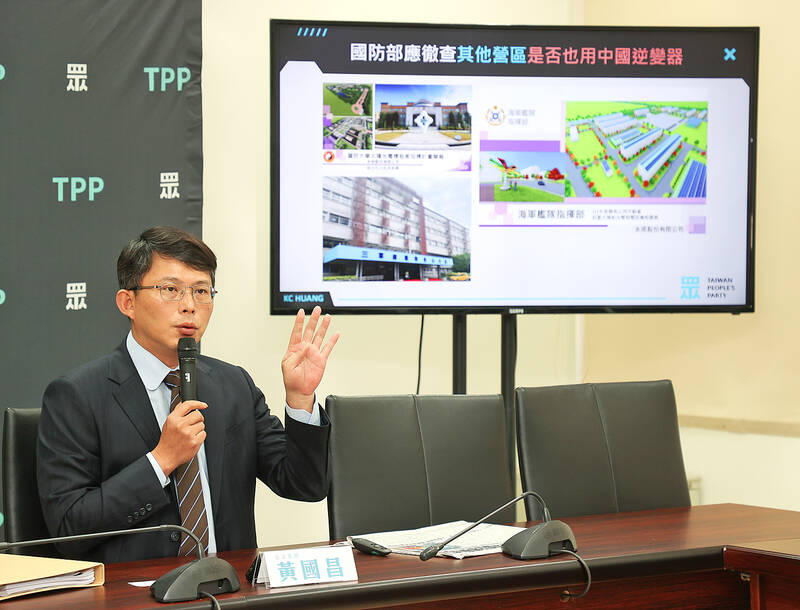Taiwan People’s Party (TPP) Legislator Huang Kuo-chang (黃國昌) yesterday said that Yongliang Ltd (永梁) had contravened the law by using China-made photovoltaic inverters in a military complex and called for a general inspection of military bases to see if there are other similar breaches.
The Legislative Yuan was criticized in 2017 for installing a photovoltaic inverter that had been made in China, Huang told a news conference in Taipei.
Democratic Progressive Party Legislator Tsai Yi-yu (蔡易餘) and others have launched a campaign to ban the use of equipment made in China to protect national security.

Photo: CNA
United Renewable Energy Co (聯合再生), the parent company of Yongliang, was founded with a NT$3 billion (US$92.15 million) investment from the National Development Fund, and yet it is using equipment manufactured in China in a military base, Huang said yesterday.
Huang showed Yongliang’s contract to lease land from the army’s Lanyang Regional Command Center and said the contract specifically said no machinery manufactured in China was to be used there.
He said he had visited the site and found that all 44 photovoltaic inverters installed at the center have the words “Made in China” on them.
United Renewable Energy issued a statement yesterday saying that purchasing photovoltaic inverters from a German company that had them assembled in China was an “error” stemming from a lack of proper management.
The company pledged to put forward proposals to swap out the equipment using 100 percent Taiwan-made equipment within three days, adding that with the Ministry of National Defense’s approval, it would make the changes as soon as possible.
Mistakes were made and the military would strive to do better, Major General Huang Chien-sheng (黃建勝), director of the Armaments Bureau’s Construction and Production Division, said in a statement.
Such incidents are not allowed, and the ministry has launched a general inquiry, Huang Chien-sheng said.
Major General Lin Chia-yao (林佳耀), director of the Army Command Headquarters’ Engineering Division, said that the command has demanded Yongliang swap out all of the equipment before July 26.
If the company failed to facilitate the swap within the given time, the army would terminate the contract, Lin said.
The army is also reviewing relevant procedures, Lin added.

‘CORRECT IDENTIFICATION’: Beginning in May, Taiwanese married to Japanese can register their home country as Taiwan in their spouse’s family record, ‘Nikkei Asia’ said The government yesterday thanked Japan for revising rules that would allow Taiwanese nationals married to Japanese citizens to list their home country as “Taiwan” in the official family record database. At present, Taiwanese have to select “China.” Minister of Foreign Affairs Lin Chia-lung (林佳龍) said the new rule, set to be implemented in May, would now “correctly” identify Taiwanese in Japan and help protect their rights, the Ministry of Foreign Affairs said in a statement. The statement was released after Nikkei Asia reported the new policy earlier yesterday. The name and nationality of a non-Japanese person marrying a Japanese national is added to the

AT RISK: The council reiterated that people should seriously consider the necessity of visiting China, after Beijing passed 22 guidelines to punish ‘die-hard’ separatists The Mainland Affairs Council (MAC) has since Jan. 1 last year received 65 petitions regarding Taiwanese who were interrogated or detained in China, MAC Minister Chiu Chui-cheng (邱垂正) said yesterday. Fifty-two either went missing or had their personal freedoms restricted, with some put in criminal detention, while 13 were interrogated and temporarily detained, he said in a radio interview. On June 21 last year, China announced 22 guidelines to punish “die-hard Taiwanese independence separatists,” allowing Chinese courts to try people in absentia. The guidelines are uncivilized and inhumane, allowing Beijing to seize assets and issue the death penalty, with no regard for potential

‘UNITED FRONT’ FRONTS: Barring contact with Huaqiao and Jinan universities is needed to stop China targeting Taiwanese students, the education minister said Taiwan has blacklisted two Chinese universities from conducting academic exchange programs in the nation after reports that the institutes are arms of Beijing’s United Front Work Department, Minister of Education Cheng Ying-yao (鄭英耀) said in an exclusive interview with the Chinese-language Liberty Times (the Taipei Times’ sister paper) published yesterday. China’s Huaqiao University in Xiamen and Quanzhou, as well as Jinan University in Guangzhou, which have 600 and 1,500 Taiwanese on their rolls respectively, are under direct control of the Chinese government’s political warfare branch, Cheng said, citing reports by national security officials. A comprehensive ban on Taiwanese institutions collaborating or

STILL COMMITTED: The US opposes any forced change to the ‘status quo’ in the Strait, but also does not seek conflict, US Secretary of State Marco Rubio said US President Donald Trump’s administration released US$5.3 billion in previously frozen foreign aid, including US$870 million in security exemptions for programs in Taiwan, a list of exemptions reviewed by Reuters showed. Trump ordered a 90-day pause on foreign aid shortly after taking office on Jan. 20, halting funding for everything from programs that fight starvation and deadly diseases to providing shelters for millions of displaced people across the globe. US Secretary of State Marco Rubio, who has said that all foreign assistance must align with Trump’s “America First” priorities, issued waivers late last month on military aid to Israel and Egypt, the